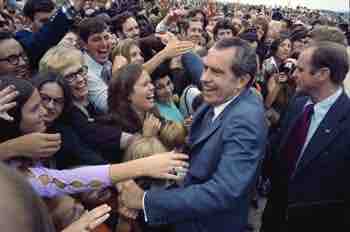General Elections in the United States
In presidential systems, a general election refers to a regularly scheduled election, where both the president, and either "a class" of or all members of the national legislature are elected at the same time. A general election day may also include elections for local officials.
In U.S. politics, general elections occur every four years and include the presidential election. Some parallels can be drawn between the general election in parliamentary systems and the biennial elections determining all House seats. There is no analogue to "calling early elections" in the U.S., however, and the members of the elected U.S. Senate face elections of only one-third at a time at two year intervals including during a general election.
Types of Elections
The United States is unusual in that dozens of different offices are filled by election, from drain commissioner to the President of the United States. Elections happen every year, on many different dates, and in many different areas of the country.
All federal elections including elections for the President and the Vice President, as well as elections to the House of Representatives and Senate, are partisan. Elections to most but not all statewide offices are partisan-oriented, and all state legislatures except for Nebraska are partisan-oriented.
Some state and local offices are non-partisan, these often include judicial elections, special district elections (the most common of which are elections to the school board, and elections to municipal (town council, city commission, mayor) and county (county commission, district attorney, sheriff) office. In some cases, candidates of the same political party challenge each other. Additionally, in many cases there are no campaign references to political parties, but sometimes even non-partisan races take on partisan overtones.
Process of Campaigning
Major campaigns in the United States are often much longer than those in other democracies. The first part of any campaign is for a candidate to decide to run in elections. Prospective candidates will often speak with family, friends, professional associates, elected officials, community leaders, and the leaders of political parties before deciding to run. Candidates are often recruited by political parties and lobby groups interested in electing like-minded politicians. During this period, people considering running for office will consider their ability to put together the money, organization, and public image needed to get elected. Many campaigns for major office do not progress past this point, as people often do not feel confident in their ability to win. However, some candidates lacking the resources needed for a competitive campaign proceed with an inexpensive paper campaign or informational campaign designed to raise public awareness and support for their positions.

Nixon Meets Crowds at Robins Air Force Base in Georgia
President Nixon "works the crowd" at Robins Air Force Base, Georgia in the initial stages of his campaign.
Once a person decides to run, they make a public announcement. This announcement consists of anything from a simple press release, to concerned media outlets, or a major media event followed by a speaking tour.
Funding for Campaigns
One of the most important aspects of the major American political campaign is the ability to raise large sums of money, especially early on in the race. Political insiders and donors often judge candidates based on their ability to raise money. Not raising enough money early on can lead to problems later as donors are not willing to give funds to candidates they perceive to be losing, a perception based on their poor fundraising performance.
Also during this period, candidates travel around the area they are running in and meet with voters; speaking to them in large crowds, small groups, or even one-on-one. This allows voters to get a better sense of who a candidate is, rather than just relying on what they read about in the paper or see on television.
Campaigns often dispatch volunteers into local communities to meet with voters and persuade people to support the candidate. The volunteers are also responsible for identifying supporters, recruiting them as volunteers or registering them to vote if they are not already registered. The identification of supporters is useful later, as campaigns remind voters to cast their votes.
Late in the campaign, campaigns will launch expensive television, radio, and direct mail campaigns aimed at persuading voters to support their candidate. Campaigns will also intensify their grassroots campaigns, coordinating their volunteers in a full court effort to win votes.